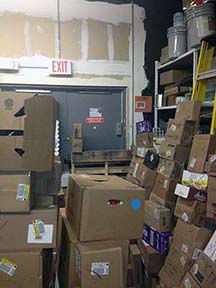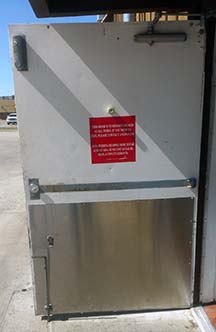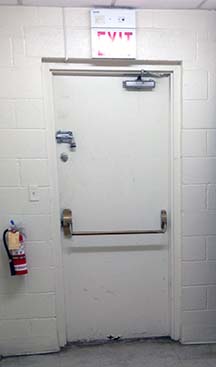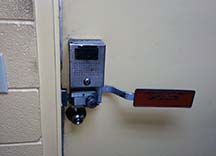Fire code violations aren’t always top of mind – it usually takes an incident or a visit from the fire marshal to spur us into action. All public facilities are subject to fire code inspections; fire marshals will often arrive unannounced to perform inspections. If cited, managers and building owners are responsible for rectifying any violations. In most instances, owners and managers are able to correct violations within the allotted time frame; however, there are times where violations are not corrected, and penalties such as fines and imprisonment are enforced. Considering the repercussions of fire code violations – serious injury or death to employees and patrons in the facility – fines are a minor consequence for those responsible.
We all remember the tragic factory fires in Bangladesh and China last year that killed over 1,000 people. In order to avoid these tragedies and ramifications, it is critical that managers be aware of fire code requirements, and that your vendor network is looking out for the best interest of you, your employees, and your patrons.
Fire code violations in the field are far from sporadic. Take a look at these images – I would be surprised if you didn’t have a location with similar violations under your authority. In many of these locations, employees and store patrons would not be able to exit through emergency doors in the event of emergency – this could have fatal ramifications. In the event of a fire inspection, if left uncorrected, these violations would result in penalties.
For example, in St. John’s County in FL, the owners and/or managers could be prosecuted in the same manner as a misdemeanor. If convicted, they would be punished by a fine not to exceed $500 and/or by imprisonment for up to 60 days.[1] If the violations are severe enough, fire marshals can shut down the building until the issues are corrected. This happened to a concert venue in GA in early February.
How to Prevent Fire Code Violations
The best way to avoid the fatal ramifications of violations, not to mention the time and cost of correcting violations is to prevent them in the first place. Before you move into a new building, you should:
- Access your cities buildings information system. This will allow you to look up complaints, violations, inspection results, and permit applications for your address.
- Check the fire department’s public records unit for any information pertaining your building.
- If you are leasing, make sure that the landlord has a valid certificate of occupancy.
Common Fire Code Violations
You can also have managers do a general check of your building(s) and correct any issues before the fire marshals perform an inspection. Below is a checklist of some of the most common fire code violations.[2]
- Exit Signs: All exit signs must be illuminated and in proper working condition.
- Exit Doors: Marked exit doors must be:
- Unblocked – ensure that boxes or merchandise are not in the way of an exit path.
- Keep doors to hallways and stairways closed; this prevents smoke and fire from entering escape routes.
- Exiting Hardware & Security: Marked exits must be able to be opened in one motion. Inside keyed locks (as shown in the picture above) are prohibited.
- Smoke Detectors: All smoke detectors must have charged batteries and be in proper working condition.
- Fire Alarms: Many counties will require that fire alarms be tested on a regular (often weekly) basis with a written record of the tests kept.
- Fire Extinguishers: Extinguishers should have annual maintenance and inspection.
- Storage of Flammable Materials: There are limitations to the kind of flammable materials that may be stored, their quantities, and their locations. Contact your building inspector to find out the specific regulations for your area.
- Pressurized Cylinders: All pressurized cylinders must be secured from falling.
- Proper Storage:
- Exit routes and exit signs must remain unblocked.
- Combustibles cannot be stored under stairways as this is a detrimental place for a fire to starts.
- Trash should be removed every 24 hours as this is a common place for fire to start.
- In many areas, sprinkler heads must have a clearance of 18” from any materials, and buildings without sprinklers must have a 24” clearance to the ceiling.
- Rated Enclosures: Any rated enclosures (examples: doors, furnaces, water heaters, wires, etc.), must not have any holes in them. If you need help determining if a door is fire-rated, check out this blog post on locating fire-rated labels.
- Vent Pipes: Vent pipes need to be inspected and repaired if there are any cracks or loose seals. This prevents harmful gases like carbon monoxide from entering the building.
- Extension Cords: Any device that is permanently mounted cannot have an extension cord on it.
- Open Electrical Panels: Keep these closed at all times to avoid molten metal from flying across the room should there be a hot enough short.
What are the Next Steps?
If you are struggling with code compliance, we recommend partnering with a vendor who is knowledgeable in fire and life safety codes. There are organizations that specialize in safety programs, but many of your current service vendors can assist you in your efforts as well. A trusted vendor will notify management of any violations they see when working in the field and will make recommendations to correct them. They shouldn’t perform any installations that will violate NFPA life safety codes. When hiring any service vendor, you should discuss their knowledge of these codes to ensure that they are a trustworthy choice. While you can use vendors as your eyes in the field, it is still critical that you train management on life safety codes.





This is some great advice for avoiding common code violations. We are especially sensitive to the open electrical panels as well as there are fire rated panels that help with that too.
The most important step to avoiding violations though, is knowing what they are. We wrote an overview here http://www.wbdoors.com/blog-layout/fire-ratings-and-what-they-mean that goes over the basics but your blog post really had some actionable recommendations.
Great addition to the list Jeff! Thanks for sharing your post. Great information!